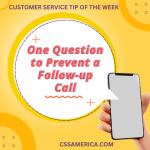You’re the customer. Do you feel that I care about you?
That’s it…that’s the key to retention. Making that person feel that you care about them. There are many ways to do this, but I’m going to go beyond the obvious discussion of eye contact, body language, tone of voice, and the words you use.
This is about strategy. This is about understanding that when the customer makes the decision to go to a competitor, they’re usually driving down the road, they’re doing a search on Google, they’re reaching for the yellow pages (yes, some people still do that), or they’re at their kitchen table. In other words, when they make that decision to leave, they’re often not in front of you.
So this strategy is about relationship building. As an example, I always like to discuss economic development organizations who are trying to keep local employers through their Business Retention & Expansion (BRE) programs. They’re great examples because these organizations have little direct control over the decisions of the local businesses, and those businesses aren’t going into the “BRE Store” 3 times a week, so the BRE professionals must know how to establish relationships with local businesses by going to the local businesses. They must meet with them, or send surveys, or send information of value, or send “marketing/sales/retention-focused” materials, or e-mail and call the business leaders.
This all needs to be part of a 12-month Touch Point Plan – a strategy you efficiently and systematically design and execute each year. Anybody in any business that depends on retention and growth with existing businesses needs a 12-month Touch Point Plan. You have to develop a plan to proactively “Touch” your clients even when they’re not in front of you. You have to take control over keeping the relationship going, keeping yourself top-of-mind, conveying you care.
We’ve taught many executives in professional basketball and professional soccer how to create these plans because their account representatives are having to manage hundreds of relationships and the resulting millions of dollars in lifetime revenue. Likewise, BRE representatives are maintaining relationships with businesses that employ thousands of staff, invest millions of dollars, and provide a significant tax and fee base for the local economy.
How do you create a plan? Well first determine 3 key types of touches:
· Pull – Information you request of them through surveys.
· Value Push – Information you provide that is simply valuable to the recipient and would address their retention drivers.
· Growth Push – Information you provide that would help them to grow their relationship with your organization.
Then build 3-4 of each touch type into a 12-month Touch Point Plan.
The key to retention is simple to identify, but the plan to retain must be created and executed in a strategic manner. So what’s your plan?
Interested in more information about Touch Point Planning? Go to: http://www.cssamerica.com/csstpp.htm
Listen to our latest episode of “Stepping Up Service” on The MESH Network at http://themesh.tv/stepping-up-service/
Read our New Book – “Ask Yourself…Am I GREAT at Customer Service?” http://www.amigreatat.com/
Interested in improving your company’s customer service? See more at our new website! http://www.cssamerica.com/





















